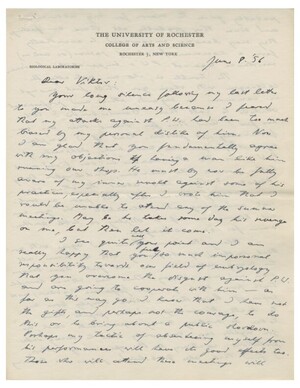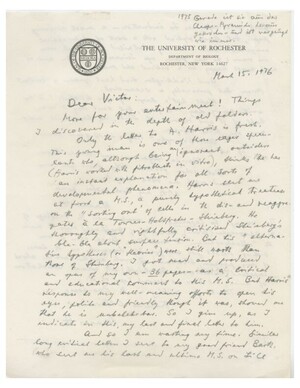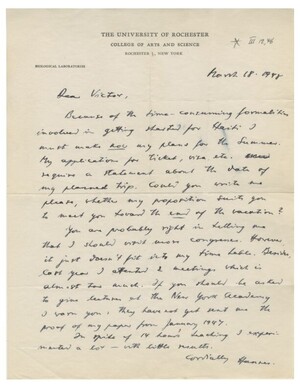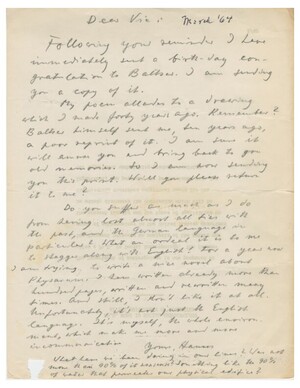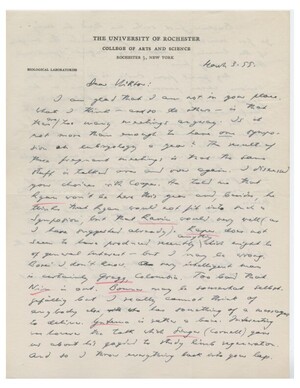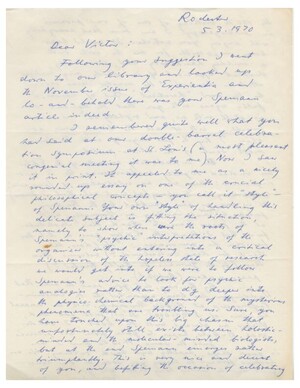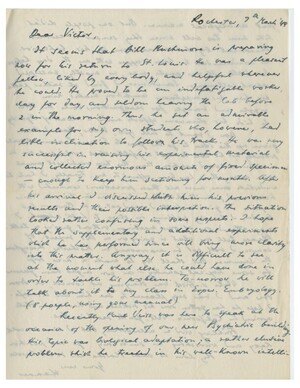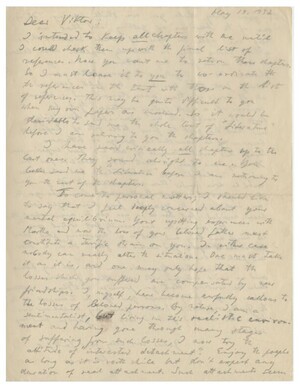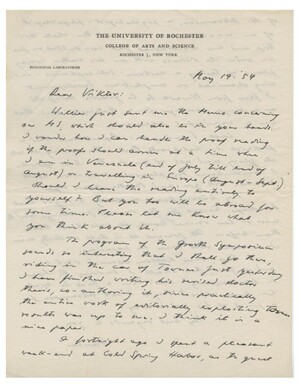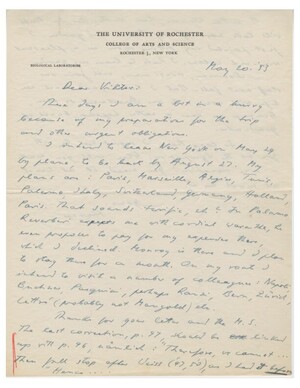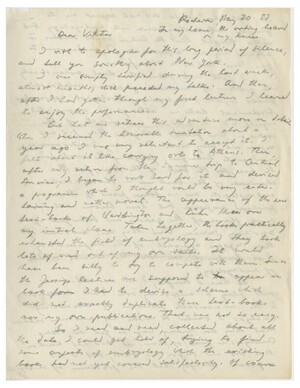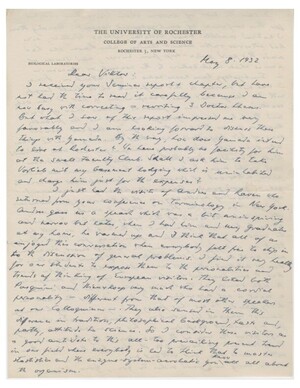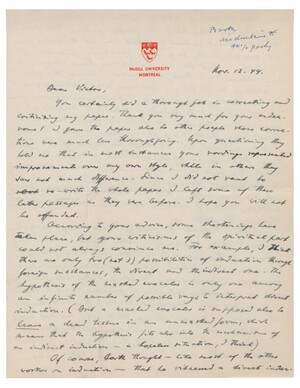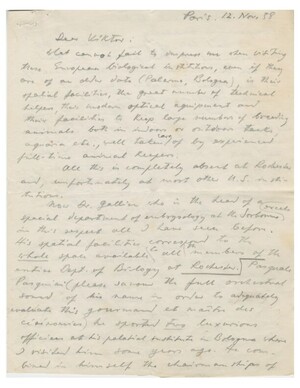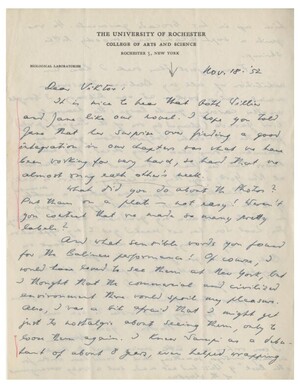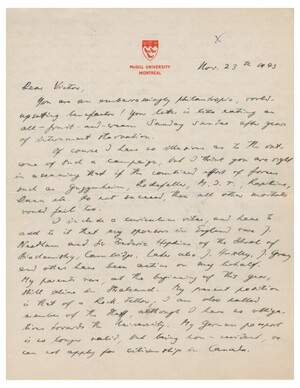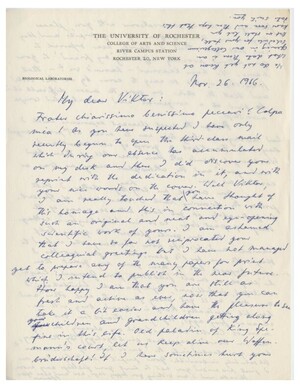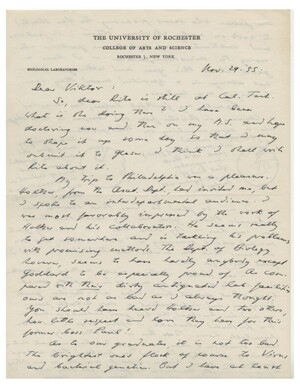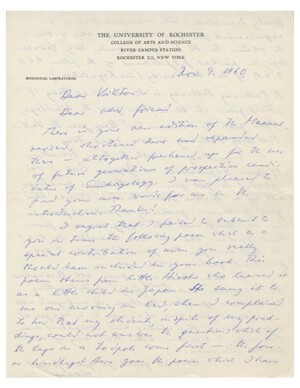Correspondence
On Holtfreter's criticism of Paul Weiss. On Niewkoop's "sloppy experiments". Critical remarks on Goldschmidt's "Theoretical Genetics". On his upcoming Jessup lectures at Columbia.
On a recent manuscript by Harris and his criticism of Steinberg. On the death of Waddington.
On the correction of the manuscript.
On his summer travel plans.
On his poem for Baltzer's birthday.
On the program for the President's Symposium at the E. Lansing Meetings.
On Hamburger's historical account of Spemann's work style in the November issue of "Experientia".
On Bill Muchmore. On a lecture by Paul Weiss on Biological Adaptation at Rochester.
On finishing their book manuscript. On Yamada's upcoming visit.
On the manuscript of "Analysis of Development". On the program for the upcoming Growth symposium. On his recent visit at Cold Spring harbor.
On his travel plans. On corrections for a manuscript.
On the new textbooks by Kuehn and Waddington. On his criticism of Trinkaus. On Paul Weiss. Programmatic letter on his research program.
On becoming a member of the National Academy.
On different styles of scientific thought in Europe and the US. On a recent book chapter draft by Hamburger.
Proposing a Journal of Embryology. On his upcoming Jessup lectures at Columbia, on recent travels.
On Hamburger's review of Holtfreter's manuscript. On theories about induction: "I find that all this kind of speculating, including my own stuff on proteins, is rather cheap. I did it only because I thought it to be a little bit more fitting than what I had read about induction, especially in Waddington's revelations. Anybody today who takes the risk of interpreting induction in general terms is bound to be caught as a blunderer. I find that all these theories of Waddington, Dalcq, Barth etc. are not much else than a hitting upon an analogy and the attempt to elaborate upon it. Some of them sound a bit more pleasant, others less so, but all are 99% poetry. Harrison and Spemann were wise enough never to go far along the slippery road of speculations but they were nevertheless kept going by the phantasmagorias of Driesch [,] Weismann, Roux and the like. Anyway, persons who emit their theories abut induction should follow them up experimentally as far a[s] possible, otherwise they are just annoying."
On European biological instititions in general. On his difficulties at University of Rochester. On visiting Gallion at Sorbonne, Paris and Pasquale Pasquini in Bologna. On Spemann. On von Frisch. On American biology: "I think that in most of the American universities the representative biologists have no longer much intimate relation to the material they are investigating, namely the animal in all its wisdom and perfection. Nowadays it is the great fashion to use the methods of biochemistry or perhaps the electron microscope in an attempt to solve the riddles of nature. But are these methods good enough? They are most useful, desirable and fruitful. However, I have come to the conclusion that the very [illegible] and startling phenomena of morphogenesis are probably beyond the resolving capacity of these approaches. The embryo is still much wiser than we are. (...)"
On Jane Oppenheimer's and Willier's opinions on the manuscript.
On the outlines for their book chapter (probably publication on Growth Symposium). On Holtfreter teaching descriptive Embryology and Histoy of Biology. On finding a new home.
On Holtfreter's grant appliactions for coming to the US.
On Rolf and Eveline Lehmann as lab visitors. On Holtfreter's and Hamburger's long-term friendship.
On a summarizing chapter on Waddington & Co. On a proposed lecture for the Growth Symposium.
On his recent talk at the Anatomical Department in Philadelphia. On drosophila wing experiments. On Martha's improving health condition.
Comments on the revised edition Hamburger's "Manual of Experimental Embryology". On Caspari.

